Distinguished Research Professors
The title of Distinguished Research Professor is awarded to faculty who are internationally recognized for their contributions to knowledge and whose work fosters continued creativity in their discipline.
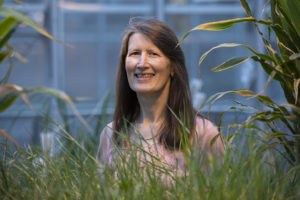
• Katrien Devos, professor of plant genetics with joint appointments in Plant Biology and Crop and Soil Sciences, is an internationally recognized plant genomics researcher. She studies the structure, function and evolution of grass genomes, with a focus on cereals, bioenergy crops and halophytic turfgrasses. She helped lead the development of the “crop circles” concept, which demonstrates relationships among different grass genomes at the genetic level. Her laboratory combines basic and applied research to understand the genetics and evolutionary biology of crops such as wheat, switchgrass, seashore paspalum and millets. Millet species such as finger millet and pearl millet are important to food security in Africa and India. Devos works with East African breeders to design more resilient and sustainable cereal varieties. She and her colleagues recently led the sequencing of both the finger millet genome and its main fungal pathogen, blast, and now are searching for genetic factors that could enhance finger millet’s resistance to blast.

• Jim Leebens-Mack, professor of plant biology, is a globally prominent researcher of evolutionary genomics and plant systematics and evolution. His research team fuses state-of-the-art evolutionary analyses with genomic approaches, advancing fundamental understanding of biological innovations in plant history. Leebens-Mack analyzes, annotates and builds databases of plant genomes, gene families and their evolutionary histories, using this information to determine the number and timing of gene and whole genome duplications. He co-led sequencing and analysis of the genome of Amborella trichopoda, a shrub-like tree species that diverged from other flowering plant species some 150 million years ago. The project was a milestone in plant biology and genomics, allowing Leebens-Mack and his team to document changes in ancestral genomes associated with the origin and explosive diversification of flowering plants. Leebens-Mack also spearheaded evolutionary analyses for the 1000 Plants Genome Initiative, an international consortium of scientists who have sequenced and analyzed transcribed genes from species across the plant kingdom.
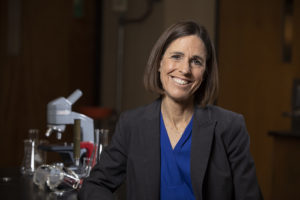
• Julie A. Luft, Athletic Association Professor of Mathematics and Science Education in the Mary Frances Early College of Education, is a leading scholar of science education. Her widely published research studies continue to significantly influence science teacher induction and teacher development both nationally and internationally, shedding light on central issues of teacher preparation, professional learning and retention. Luft has translated her research on teacher education and learning into applications that benefit practicing teachers and the broader education community. She served on the committee that wrote the influential 2015 National Academies of Sciences, Engineering and Medicine report on science teachers’ learning, which identified a lack of opportunities and recommended changes to address science teachers’ professional development. Luft’s current work focuses on improving such opportunities for newly hired science teachers, exploring a novel format of professional learning for science teacher leaders and examining the content knowledge and instruction of early-career science teachers when they teach outside of their expertise.

• Ignacy Misztal, professor of animal and dairy science, is one of the most prominent computational animal breeders in the world, driving commercial and research advances in livestock improvement. His work applies genetic evaluation methodologies and computational strategies to improve livestock production and sustainability. His goal is to develop genetically superior animals through sophisticated modeling and analytics involving millions of performance records and pedigrees. Misztal invented a widely used, single-step method for genetic evaluation that combines genomic, phenotypic and pedigree information simultaneously. This cost-effective tool is considered the simplest method for large-scale, genomic livestock evaluations and has been adopted internationally by the industry. He also developed one of the industry’s popular software suites for animal breeding, with both research and commercial applications. Misztal’s sponsors use the commercial application, but most of the software is available for free through the cloud and is used in at least 50 countries.
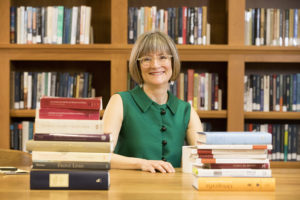
• Elizabeth Wright, professor of Spanish, is an internationally recognized scholar of Spanish “Golden Age” literature and culture. With more than two decades of energetic, influential and innovative scholarship, she has cast a new light on how Spanish empire building after 1492 transformed the writing practices and literary genres with which individuals and communities made sense of a rapidly changing world. Her current book project, Stages of Servitude: Scenes from the Atlantic Slave Trade, examines how slave trafficking was made socially and economically acceptable in the Spanish world even as rulers and the public acknowledged its cruelty and illegality. But the study also explores how both enslaved and free blacks negotiated economic advancement and even claimed artistic validation. She is also editor of the Bulletin of the Comediantes, the premier scholarly journal devoted to the study of Spain’s Golden Age theater and 2019 winner for Best Journal Design given by the Council for Editors of Learned Journals.
Creative Research Awards
Creative Research Awards recognize outstanding bodies of work that have gained broad recognition.

The Williams A. Owens Award is given to recognize an outstanding body of nationally and internationally recognized scholarly or creative activities in the social and behavioral sciences. The social and behavioral sciences received significant contributions to psychology through the research and leadership of William A. Owens. He particularly served the University by founding and directing the Institute for Behavioral Research. The recipients of this award, established in 1985, illustrate the example of dynamic research that William A. Owens typified.
Steven M. Kogan is the UGA Athletic Foundation Professor of Human Development in the department of human development and family science in the College of Family and Consumer Sciences. Kogan’s research investigates important stressors that drive risky behaviors and mental health challenges among rural, Southern adolescent and young-adult African Americans, and then translates these findings into evidence-based family intervention projects. He undertakes longitudinal, quantitative modeling of the mechanisms that drive risky behavior across multiple levels and across time. Kogan’s research documents how community, family, genetic and psychological risk factors affect the well-being of young African Americans in general, and young men in particular. His recent research examines whether family-centered interventions could be more effective if timed and implemented at crucial developmental transition points, creating real-world public health benefits by reducing risky behavior and substance abuse.

The Lamar Dodd Award is given to recognize an outstanding body of nationally and internationally recognized scholarly or creative activities in the sciences. Lamar Dodd’s artwork extended into the American West and even into space when he was commissioned by NASA and the Department of the Interior to creatively record numerous scientific achievements. His scientific artwork joined imagination and scientific reality. For this reason, the Lamar Dodd Award was established in 1981 in his honor.
John Maerz, Josiah Meigs Distinguished Teaching Professor in the Warnell School of Forestry and Natural Resources, is a foremost vertebrate ecologist who studies processes that create and sustain biodiversity in a rapidly changing world. He applies his understanding of ecology, evolutionary biology and wildlife management to advance knowledge of many species’ natural history and inform conservation activities. Maerz’s research combines a deep understanding of both organismal and ecosystems ecology and the challenging interface between the two. His cross-disciplinary studies have allowed him to ask fundamental questions about organisms and ecosystems while producing information critical to solving real-world environmental problems. His work focuses on amphibians and reptiles, but he also studies birds and invertebrates. Maerz’s current research addresses the impacts of nonnative species, climate and land use on the ecology of native wildlife, while examining how animals influence ecosystem processes and how ecological principles can be applied to inform the conservation and management of wildlife.
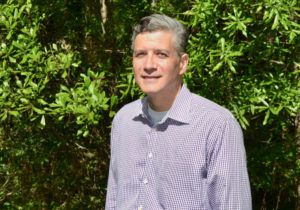
The Albert Christ-Janer Award is given to recognize an outstanding body of nationally and internationally recognized scholarly or creative activities in the creative arts and humanities. The broad spectrum of interests within this award’s scope reflect the accomplishments its namesake. Albert Christ-Janer was an artist of varied form and endless creativity. He became the first Callaway Professor of Art at the University of Georgia in 1970. This award was dedicated to his memory in 1980, seven years after his death.
Richard Menke, associate professor of English, is an innovative scholar of Victorian media studies, creatively crossing traditional disciplinary boundaries between literature and technology. He has transformed how scholars think about relationships between the realist Victorian novel and the era’s emerging media and communication technologies, such as the electric telegraph and wireless telegraphy. These advanced methods and tools presented competition to the written word, not by displacing print but by integrating various literary and technological forms. This new, media-rich world became an important element of storylines and themes in Victorian fiction, shaping forms and content of imaginative writing. By the late 19th century, writers began viewing print as only one media among many. Menke illuminates how these changes were continual, rearranging and rebalancing diverse technologies in an expanding system of media. His body of work demonstrates original and substantive contributions to the study of Victorian literature.
Creative Research Medals
Creative Research Medals are awarded for outstanding research or creative activity within the past five years that focuses on a single theme identified with the University of Georgia.
Creative Research Medal in Humanities and Arts

Joshua Bynum, associate professor of trombone in the Hugh Hodgson School of Music, recently released a pioneering album, “Catalyst,” that features musical compositions inspired by icons from classical music, literature and paintings. “Catalyst” was hailed as “a must-have recording” with Bynum’s playing described as having “inspiring energy combined with a warm and lyrical approach” in International Trombone Association Journal, the leading publication in his field, and also earned Bynum praise from the composers. The album also led to an invitation for him to perform as a featured artist at the 2017 International Trombone Festival, the world’s premier gathering of trombonists. Bynum is the first-call substitute trombonist for the Atlanta Symphony Orchestra, performing several concerts each season. He is also a sponsored “artist and clinician” of the Edwards Instrument Company, and is the managing editor and chief contributor for the Pedagogy Corner column of the ITA Journal.
Creative Research Medal in Social and Behavioral Sciences
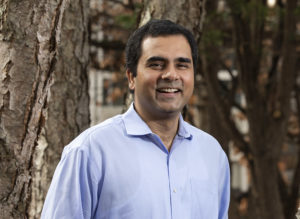
Puneet Dwivedi, associate professor of forest sustainability, studies the impact of heirs’ property on sustainable forest management among African American forest landowners in the southern United States. Title to an heir’s property belongs to the deceased person, resulting in a shared but undivided ownership structure. This increases the vulnerability of African American landowners to potential land loss, thus affecting their ancestral ties with the land. A clear land title could facilitate African American forest landowners’ participation in federal and state cost-share programs, helping them grow family income through improved forest management, thereby aiming for land ownership and successful intergenerational land transfer. Dwivedi and his collaborators have built partnerships with state and federal agencies, nonprofit organizations and other universities, including Fort Valley State University. His research has helped African American forest landowners in practicing sustainable forest management in Georgia and beyond.
Creative Research Medal in Natural Sciences and Engineering

Natarajan Kannan, associate professor in the department of biochemistry and molecular biology and the Institute of Bioinformatics, employs a multi-disciplinary approach to understand fundamental functions of biomedically important protein families. His pioneering research addresses the evolutionary systems biology of protein kinases, which are enzymes that turn signals on and off in cells—a critical part of cell communication. Protein kinases are involved in a range of diseases from malaria to cancer. Kannan develops computational and experimental approaches to understand how natural sequence variation contributes to functional variation in protein kinases and how non-natural variation contributes to disease. With his interdisciplinary approach combining biochemistry and bioinformatics, he is advancing understanding of the mechanisms of protein kinase regulation and specificity, which are poised to advance ongoing drug development studies in this class of anti-cancer and infectious disease targets.
Creative Research Medal in Natural Sciences and Engineering
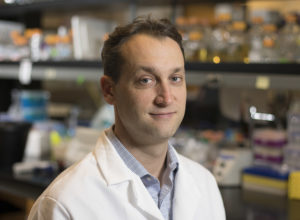
Bob Schmitz, associate professor in the department of genetics, is studying new ways to create beneficial crop traits. Genetic variation is already exploited for crop improvement, but another kind of variation—epigenetic—has yet to be efficiently implemented. Epigenetic variation in plants occurs naturally and spontaneously, arising not from a change in the DNA sequence but from changes in DNA methylation. Such variation can result in novel and stably inherited phenotypes, as well as unique patterns of gene expression. His lab creates maps of where DNA methylation occurs in certain plants. Schmitz unexpectedly discovered extensive variation in how plant genomes use DNA methylation for a variety of cellular processes, even though they possess the same enzymes that are involved in adding methylation to DNA. Through comparative and experimental approaches, Schmitz and his colleagues are exploring development of technologies to alter DNA methylation for the purposes of inducing variation in gene expression to enhance trait variation.
2020 Inventor of the Year Award
Each year, the Board of Directors of the Research Foundation choose a member of the University of Georgia faculty as the inventor of the year. The selection is based on the invention’s originality, innovation and impact outside the university setting.
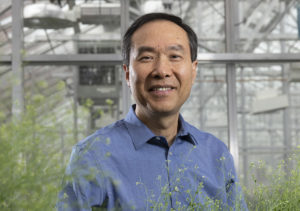
Zheng-Hua Ye, professor in the department of plant biology, developed a trait that reduces lignin content in alfalfa without reducing the cultivar’s strength with funding from the Department of Energy. Lignin allows alfalfa to stand up vertically in the field, but it is not very digestible as forage. The new trait “rewires” how the plant produces lignin, resulting in strong but more digestible alfalfa. The trait was licensed by the University of Georgia Research Foundation (UGARF) to the Oklahoma-based Noble Research Institute, which commercialized it as HarvXtra® Alfalfa. Nobel sub-licensed the trait to Forage Genetics International, which sells the product, generating nearly $1 million in U.S. license revenue. HarvXtra® Alfalfa is the most advanced alfalfa trait on the market and the first genetically engineered trait developed to maximize quality by reducing lignin content. This is the first time UGARF has received a share of a genetic “trait fee” associated with an improved plant cultivar.
2020 Entrepreneur of the Year Award

The Entrepreneur of the Year Award recognizes a faculty member who has started a company based on research originated at UGA.
Biao He, GRA Distinguished Investigator and the Fred C. Davison Distinguished University Chair in Veterinary Medicine, is a renowned virologist and vaccine developer who has founded numerous biotechnology companies to develop new vaccines. His UGA research has led to four issued U.S. patents and 19 foreign patents. His work on the virus known as PIV5, which has an excellent safety profile, has been translated into vaccines and treatments for deadly infections such as rabies, tuberculosis and HIV. The University of Georgia earned the patent for the PIV5 vaccine platform that He developed, and many companies have since licensed it. The Georgia Research Alliance-funded startup company CyanVac is developing vaccines against several animal and human diseases based on He’s research. More recently, he founded Blue Lake Biotechnology, Inc., to develop PIV5-based vaccines for human disease with an initial focus on respiratory syncytial virus. In 2019, Blue Lake secured private investment of $6 million to fund RSV vaccine development.
Early Career Scholar Awards
Fred C. Davison Early Career Scholar Award

Named in honor of the University of Georgia’s 18th president, this award recognizes outstanding accomplishment and evidence of potential future success in scholarship, creative work or research by an early career faculty member in the sciences.
Alexander Bucksch is an assistant professor of computational plant biology. He develops innovative computational methods to study plant organizational levels from a mathematical perspective. He expands to plant science the mathematical concept of “shape descriptors,” which reveal the state and growth of complex structures. Using imaging instruments, Bucksch captures spatial arrangements of branches, roots and other organs that together form complex morphological phenotypes. His interdisciplinary methods have led to discoveries of phenotypes on scales ranging from populations to gene regulatory elements that had been hidden to classically trained biologists. Bucksch’s work increases understanding of plant adaptions to changing environments, which could benefit crop yield and public health. More than 600 researchers use his methods through the world’s largest root phenotyping platform, Digital Imaging of Root Traits. His work was recognized by an NSF CAREER Award in 2019 and the 2020 Early Career Award from the North American Plant Phenotyping Network.
Charles B. Knapp Early Career Scholar Award
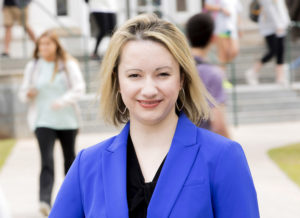
Named in honor of the University of Georgia’s 20th president, this award recognizes outstanding accomplishment and evidence of potential future success in scholarship, creative work or research by an early career faculty member in the social and behavioral sciences.
Dorothy R. Carter, assistant professor of industrial-organizational psychology, conducts research that helps organizations rethink the management of complex human systems comprised of multiple teams. Multi-team systems are deployed to tackle high-risk/high-reward challenges in contexts such as the military, medicine, disaster response and space exploration. Carter’s work aims to answer fundamental questions about the drivers of team and multi-team system effectiveness. In her work with NASA, she is identifying processes and interventions to support multi-team collaboration throughout long-duration missions to Mars. Through her NSF-funded research, she and her collaborators are surveying and providing feedback to senior-level executives about the teamwork processes needed to ensure strategic effectiveness. Carter also works with the U.S. Army to enhance military team staffing decisions, and she studies team- and institution-level interventions to support interdisciplinary science teams. Her research has already made an impact across a range of disciplines, including psychology, management, communications and medicine.
Fred C. Davison Early Career Scholar Award
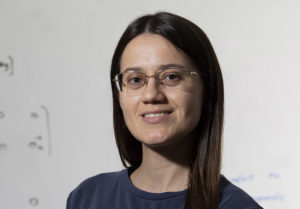
Named in honor of the University of Georgia’s 18th president, this award recognizes outstanding accomplishment and evidence of potential future success in scholarship, creative work or research by an early career faculty member in the sciences.
Daniela Lourenco, assistant professor of animal breeding, genetics and genomics in the College of Agricultural and Environmental Sciences, is already a global leader in developing statistical models and computational tools for improving animal genetics, with the goal of increasing animal production, health and efficiency. She helped develop a one-step method that integrates animals’ genomic information with their phenotype and lineage to produce an estimated breeding value (EBV), which producers can use to make selection decisions. Lourenco implemented this method for the American Angus Association for genetic evaluations of Angus and Charolais beef cattle. She has also helped design genetic evaluations for chicken, dairy cattle, fish and pigs. Commercial companies and breed associations can use the software to increase production of various traits based on DNA information. Working with a team in the UGA Animal Breeding and Genetics Group, Lourenco helped to develop methods and tools that are now used all over the world.
Michael F. Adams Early Career Scholar Award

Named in honor of the University of Georgia’s 21st president, this awards recognizes outstanding accomplishment and evidence of potential future success in scholarship, creative work or research by an early career faculty members in the arts and humanities.
Peter Van Zandt Lane, assistant professor of music composition in the Hugh Hodgson School of Music, is an internationally recognized composer with impressive accomplishments in concert music, with an emphasis on music for wind ensembles and electroacoustic music. The American Academy of Arts and Letters awarded him the prestigious Charles Ives Fellowship, noting “at every turn, his propulsive, incisive work is beautifully and confidently made. . . Lane’s music is as inviting as it is sophisticated.” His compositions have appeared on eight commercial recordings by top contemporary classical labels, most recently including soloists with the Atlanta Symphony and New York Philharmonic. His music has been performed at top venues including Carnegie Hall, National Sawdust, the Netherland’s Tivoli Hall and Atlanta’s Woodruff Arts Center. Despite the volume of his creative work, he is a dedicated pedagogue who is fully invested in the success of his students.


